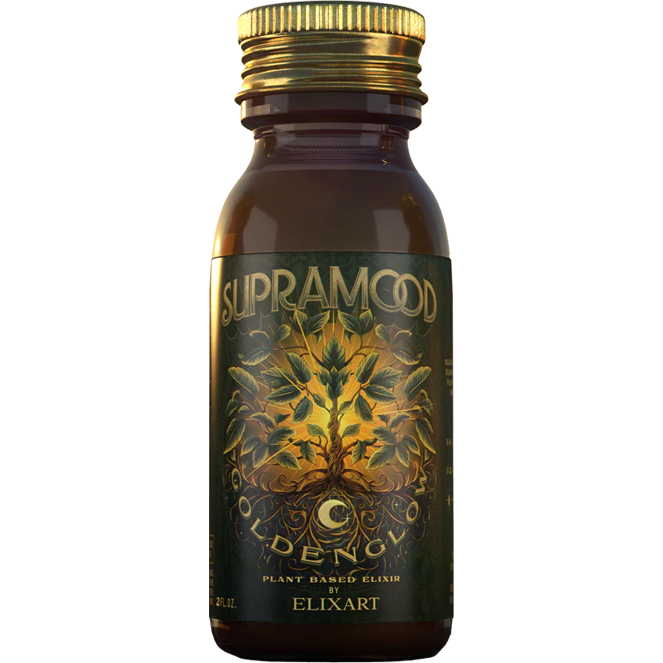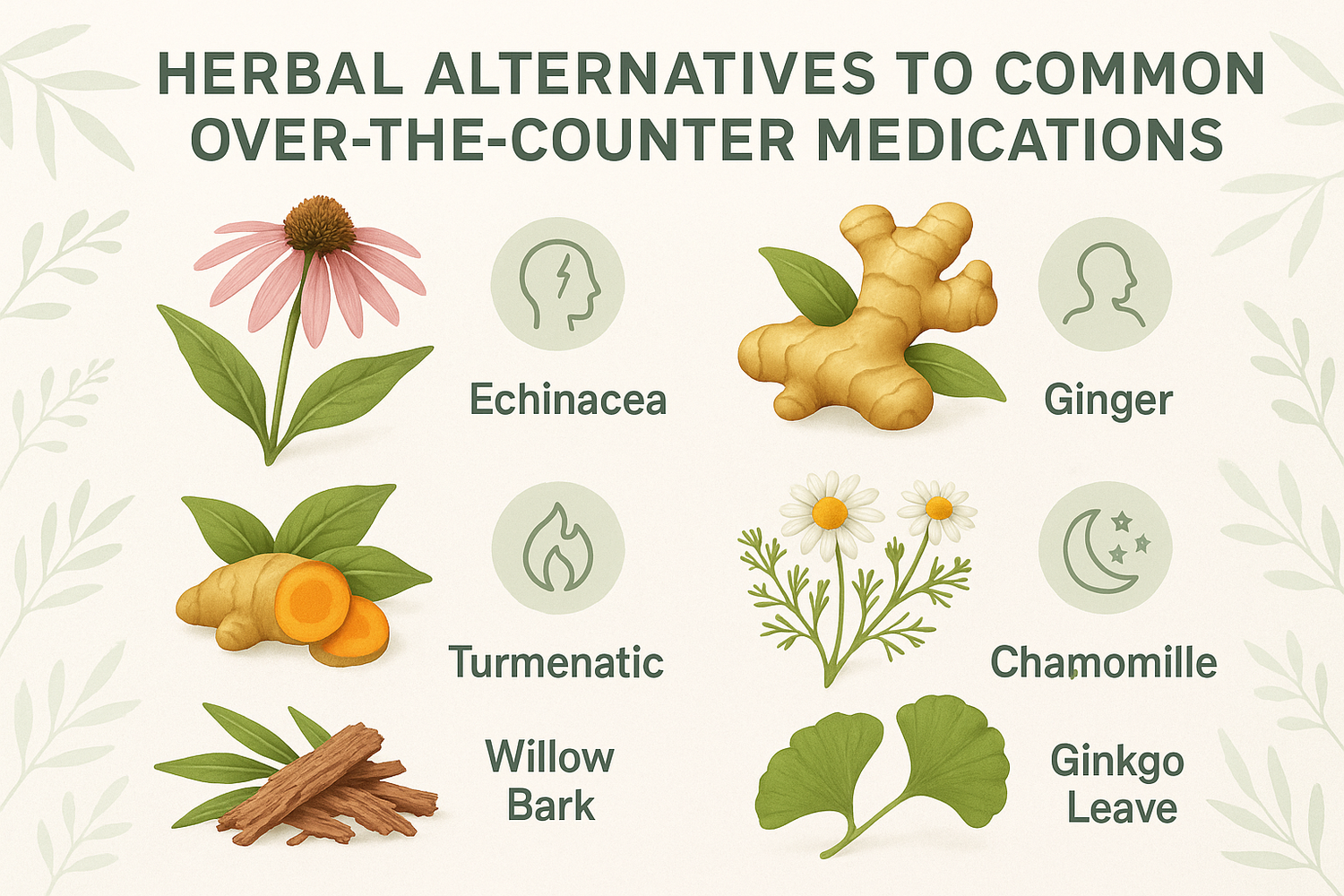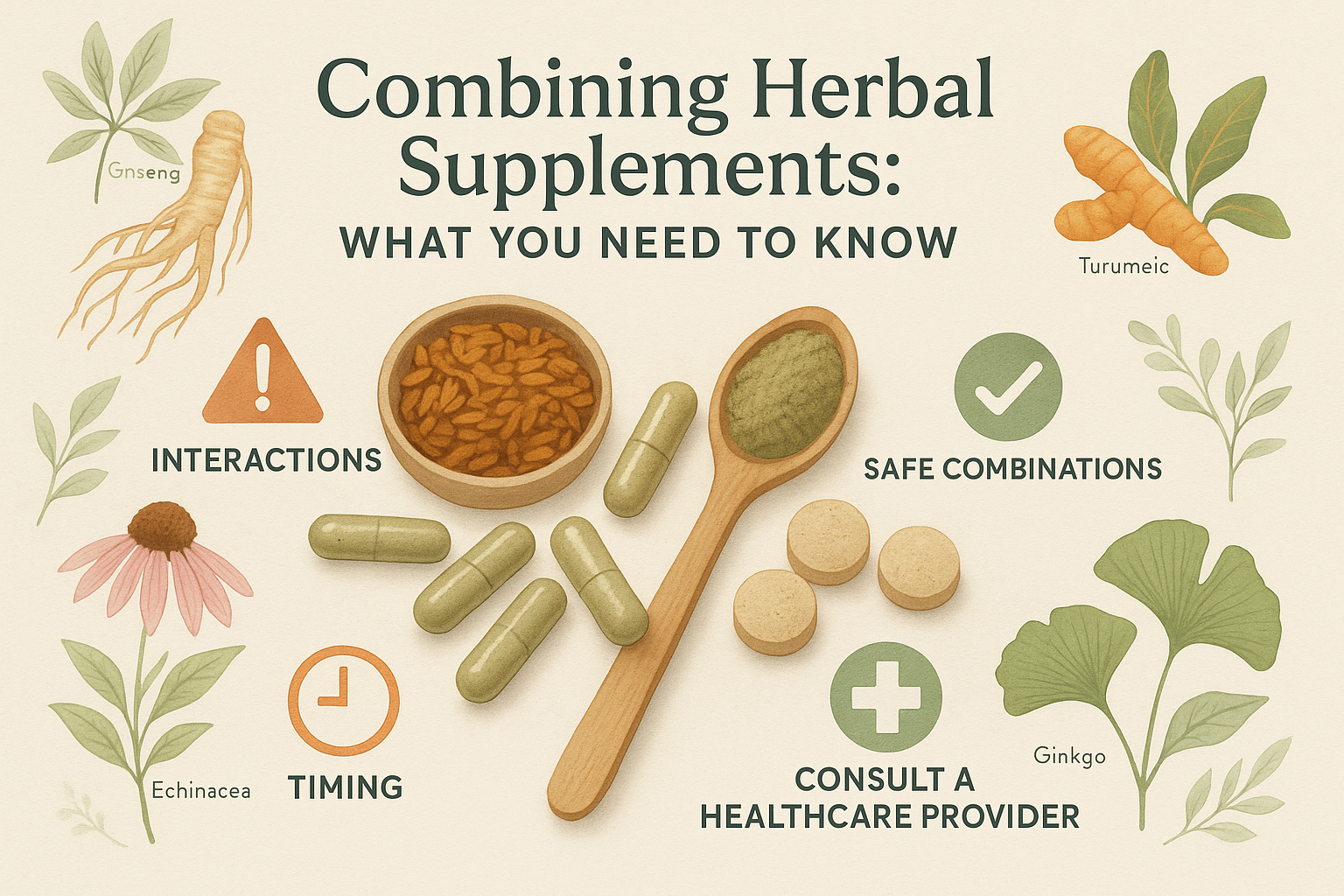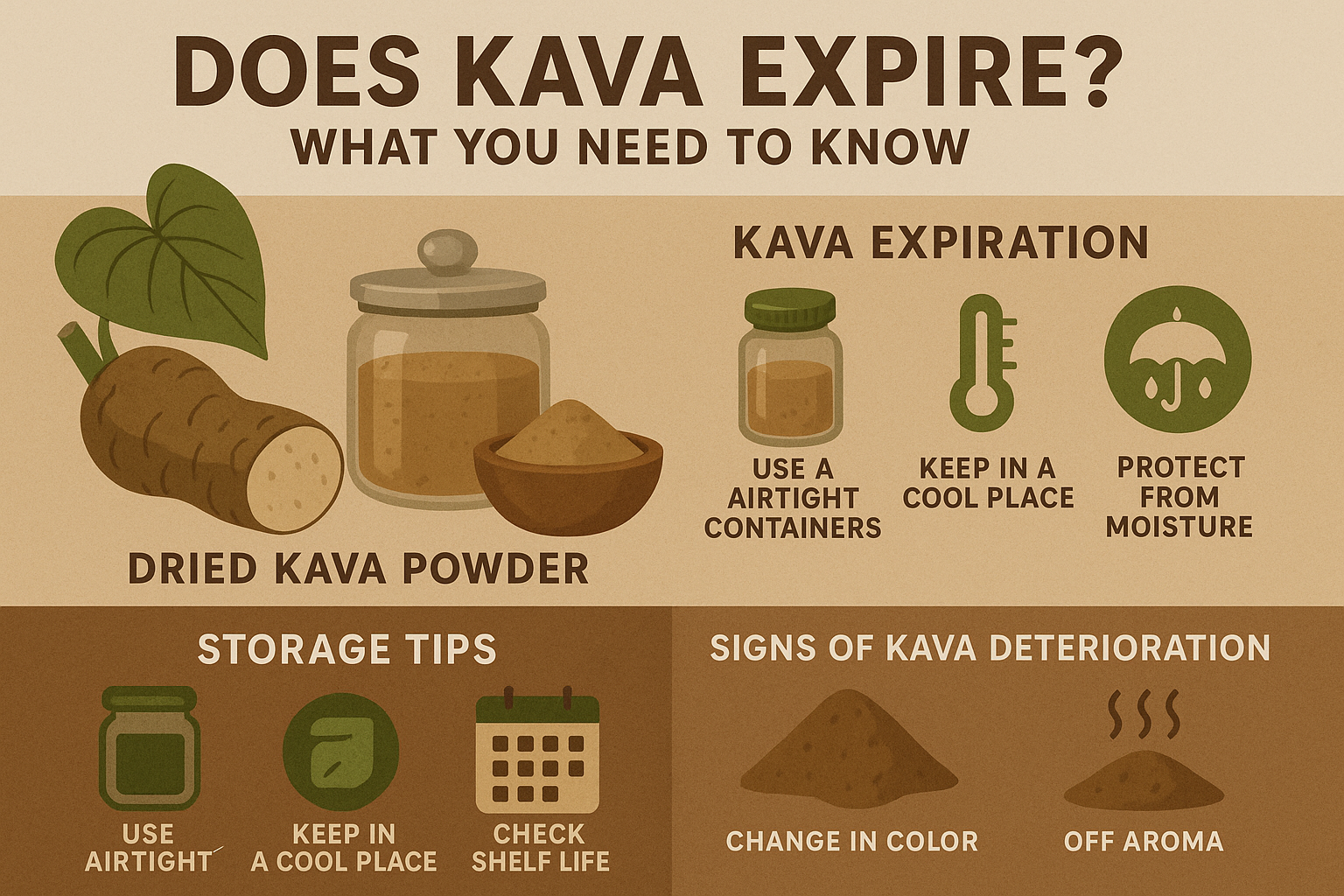The rise in popularity of herbal alternatives to common over-the-counter (OTC) medications reflects a growing interest in natural remedies for addressing health issues. Many people are turning to herbal supplements, seeking holistic approaches that often align with traditional medicine practices.
Herbal alternatives offer various benefits:
- Echinacea: Known for boosting the immune system.
- Garlic: Valued for cardiovascular health.
- Ginkgo Biloba: Used to enhance cognitive function.
- Ginseng: Believed to increase energy levels.
- St. John's Wort: Commonly used for mood regulation.
- Feverfew: Traditionally used for migraine prevention.
However, it is essential to approach the use of these natural remedies with caution. While they can provide relief for certain conditions, they often lack the rigorous clinical testing that pharmaceutical drugs undergo. This distinction raises concerns about their efficacy and safety.
Key takeaway: While herbal supplements can offer benefits for specific conditions, informed decision-making and consulting healthcare providers are crucial. This ensures safe integration with conventional treatments and avoids potential interactions or side effects.
Understanding Herbal Supplements
1. Echinacea
Echinacea is a popular herbal supplement, often sought for its potential immune support properties. This herb, native to North America, has been utilized by Native American tribes for centuries due to its believed ability to combat infections and wound healing.
Description and Benefits
- Botanical Background: Echinacea, also known as coneflower, belongs to the Asteraceae family. There are several species of Echinacea, but Echinacea purpurea and Echinacea angustifolia are most commonly used in supplements.
- Immune Support: The primary reason people turn to Echinacea is for its immune-boosting effects. It is often taken at the onset of cold symptoms with the hope of reducing severity and duration.
- Forms of Consumption: You can find Echinacea in various forms such as capsules, teas, tinctures, and extracts. Each form may offer different levels of the active compounds.
Evidence from Studies
Research on Echinacea's effectiveness provides mixed results. Some studies suggest benefits, while others show limited or no effect.
- Positive Findings:
- A study published in the Journal of Clinical Pharmacy and Therapeutics found that Echinacea may reduce the risk of developing colds by 58% and decrease cold duration by 1.4 days.
- Another study in Phytomedicine indicated that Echinacea extracts could enhance immune function by increasing white blood cell activity.
- Skeptical Views:
- The Cochrane Database of Systematic Reviews reviewed multiple trials and concluded that evidence supporting Echinacea's effectiveness for treating colds is weak.
- A randomized controlled trial reported in The New England Journal of Medicine found no significant difference between Echinacea and placebo in preventing or treating colds.
Considerations
While some evidence supports Echinacea's role in immune support, it's crucial to approach its use with informed caution.
- Interactions: Echinacea may interact with certain medications such as immunosuppressants or drugs metabolized by the liver.
- Side Effects: Although generally considered safe for short-term use, potential side effects include gastrointestinal discomfort and allergic reactions, especially in individuals allergic to ragweed or other members of the Asteraceae family.
Understanding these aspects can help you make an informed decision about incorporating Echinacea into your health regimen. Always consult a healthcare provider before starting any new supplement.
2. Ginkgo Biloba
Ginkgo Biloba, often simply called Ginkgo, is a key part of traditional medicine known for its potential benefits in improving brain function. It comes from one of the oldest tree species on Earth and has been used for centuries in various cultural healing practices.
Key benefits of Ginkgo Biloba include:
- Cognitive Enhancement: Widely recognized for its potential to improve memory and cognitive speed, especially in older individuals.
- Antioxidant Properties: Contains flavonoids and terpenoids, which may help fight oxidative stress.
- Circulatory Support: Believed to improve blood flow, which can benefit brain health and overall circulation.
Several studies have looked into how effective Ginkgo is. For example, research published in the Journal of the American Medical Association found that Ginkgo might slow down cognitive decline in older adults with mild to moderate dementia. Another study highlighted in Psychopharmacology reported improvements in attention and memory among participants who took Ginkgo supplements.
Despite these hopeful findings, it's important to be cautious when considering Ginkgo supplementation. Like many herbal supplements, the quality and concentration can vary between products. It's always best to consult a healthcare provider before starting any new supplement routine to ensure it's safe for you.
3. Ginseng
Ginseng is widely recognized as a potent energy booster within the realm of herbal supplements. This herb has been used for centuries in traditional medicine, particularly in East Asia, to enhance physical stamina and mental performance.
Scientific Literature Supporting Ginseng's Energizing Effects:
- Performance Enhancement: Studies have indicated that ginseng can improve physical performance by reducing fatigue and enhancing endurance. For instance, research published in the Journal of Ethnopharmacology found that ginseng extract significantly increased exercise capacity and reduced oxidative stress in athletes.
- Mental Clarity: Cognitive function also benefits from ginseng. A study in the Journal of Ginseng Research demonstrated improvements in working memory and reaction time in individuals who consumed ginseng supplements.
- Adaptogenic Properties: As an adaptogen, ginseng helps the body resist stressors of various kinds, whether physical, chemical, or biological. This adaptogenic quality contributes to its reputation as an energy booster.
Forms and Usage:
Ginseng is available in various forms, including:
- Capsules
- Teas
- Tinctures
- Extracts
Cultural Context:
Ginseng's use dates back thousands of years, most notably within Traditional Chinese Medicine (TCM). It fits into the broader category of Complementary and Alternative Medicine (CAM), offering a natural option for those seeking alternatives to conventional energy-enhancing medications.
Incorporating ginseng into your routine may provide numerous benefits, but consultation with a healthcare provider is crucial to avoid potential interactions with other medications or conditions.
4. St. John's Wort
St. John's Wort (Hypericum perforatum) is a well-known herbal supplement frequently recommended for its potential role in mood regulation. This plant has a long history in traditional medicine, particularly for treating mental health conditions like mild to moderate depression.
Antidepressant Properties
Clinical studies have provided evidence supporting its antidepressant properties. For instance, several trials have shown that St. John’s Wort can be as effective as standard antidepressants, such as selective serotonin reuptake inhibitors (SSRIs), for individuals with mild to moderate depression. One study published in the Journal of Clinical Psychopharmacology found that patients taking St. John’s Wort experienced significant improvements in mood compared to those on a placebo.
How It Works
The active compounds in St. John’s Wort, including hypericin and hyperforin, are thought to contribute to its mood-regulating effects by influencing neurotransmitter activity in the brain. These compounds may help increase levels of serotonin, dopamine, and norepinephrine, which are critical for maintaining emotional balance.
Caution with Medications
However, users should exercise caution. St. John’s Wort is known to interact with various medications due to its effect on liver enzymes involved in drug metabolism. This interaction can reduce the effectiveness of other treatments and lead to adverse effects. Consulting a healthcare provider before starting this supplement is crucial, especially if you are already on medication.
Understanding the benefits and risks associated with St. John's Wort helps you make informed decisions about integrating this herb into your wellness regimen without compromising your overall health. It's also worth noting that while many people find relief using this herb, it's not universally effective for everyone, and some studies suggest it may not work for severe depression (PubMed Study).
5. Feverfew
Feverfew, a herb with a long history in traditional medicine, is primarily known for its use in migraine relief. This herbal supplement, derived from the plant Tanacetum parthenium, has been utilized for centuries to treat various ailments, particularly headaches and fevers.
Traditional Use and Historical Context:
- Feverfew has roots in ancient Greek and European herbal medicine where it was commonly prescribed to alleviate headaches and migraines.
- Its use extends to treating arthritis, digestive problems, and skin conditions.
Scientific Evidence:
Numerous studies have investigated Feverfew's efficacy in reducing the frequency and severity of migraines. Some key findings include:
- Clinical Trials: Research has shown that Feverfew can help reduce the number of migraine attacks. For instance, a study published in the journal Clinical Drug Investigation demonstrated that participants taking Feverfew experienced fewer migraines compared to those on a placebo.
- Mechanism of Action: The active compounds in Feverfew, such as parthenolide, are believed to inhibit the release of serotonin and other substances that dilate blood vessels in the brain, thus preventing migraine onset.
Forms and Usage:
Feverfew is available in various forms including:
- Capsules
- Tablets
- Tinctures
- Teas
It's generally recommended to consult a healthcare provider before incorporating Feverfew into your regimen, especially if you are pregnant or taking other medications.
Incorporating herbal supplements like Feverfew into your health routine can offer natural alternatives to conventional treatments. However, always ensure you rely on credible sources and professional advice for safe usage.
6. Garlic
Garlic has been used in traditional medicine for a long time and is known for its potential benefits for heart health. This herbal supplement contains a compound called allicin, which is believed to be responsible for many of its healing properties.
Potential Benefits:
- Cholesterol-lowering effects: Studies suggest that garlic can help reduce total cholesterol levels, particularly LDL cholesterol, which is often referred to as "bad" cholesterol.
- Antioxidant properties: Garlic is noted for its ability to combat oxidative stress, which plays a role in various cardiovascular conditions.
- Blood pressure regulation: Some research indicates that garlic may aid in reducing blood pressure, making it beneficial for individuals with hypertension.
Research Highlights:
A meta-analysis published in the Journal of Nutrition found that garlic supplementation significantly lowered total and LDL cholesterol levels in individuals with high cholesterol. Another study highlighted in Phytomedicine demonstrated that garlic's antioxidant properties could help mitigate the damage caused by free radicals, further supporting cardiovascular health.
Garlic's use in complementary and alternative medicine (CAM) shows its importance in modern healthcare practices. It demonstrates how traditional knowledge continues to shape current wellness strategies, offering natural options alongside conventional treatments.
The Role of Kava in Stress Management
Kava's Historical Use and Current Research on Its Effects on Anxiety
Kava, a plant native to the South Pacific islands, has been traditionally used for centuries in these regions for its calming effects. Islanders prepared a beverage from the root of the kava plant, consuming it during social and ceremonial occasions to promote relaxation and enhance social interaction.
Historical Use:
- Traditional societies: Kava was integral to rituals and community gatherings, symbolizing peace and unity.
- Preparation: The root of the kava plant was pounded into a pulp and mixed with water to create a drink known for its sedative properties.
In modern times, kava has gained attention as a potential natural alternative for managing stress and anxiety. Its active compounds, known as kavalactones, are believed to interact with brain receptors associated with mood regulation.
Current Research:
- Efficacy in Anxiety Reduction: Studies have examined kava's impact on anxiety disorders. A notable study published in the Journal of Clinical Psychopharmacology found that participants taking kava experienced significant reductions in anxiety symptoms compared to those on a placebo.
- Safety Profile: Research indicates that while kava can be effective for short-term use, long-term consumption might pose risks such as liver damage. This has led some countries to regulate or restrict its sale.
Despite these concerns, kava remains popular among individuals seeking herbal alternatives to conventional anti-anxiety medications. It's available in various forms, including capsules, tablets, and teas.
Considerations for Use:
- Consultation with Healthcare Providers: Due to potential interactions with other medications and health conditions.
- Quality Control: Ensuring the product is sourced from reputable suppliers to avoid contaminants that can exacerbate health risks.
Kava's historical roots and contemporary research underline its potential role in stress management. While beneficial for certain individuals, it's essential to approach its use cautiously, emphasizing informed decision-making based on current scientific evidence.
Regulatory Status and Quality Control Issues with Herbal Supplements
Herbal supplements differ significantly from prescription medications in how they are regulated. Under the Dietary Supplement Health and Education Act (DSHEA) of 1994, the FDA categorizes herbal supplements as dietary products rather than drugs. This distinction means that these products do not undergo the rigorous pre-market approval process required for pharmaceuticals.
Key Differences in Regulation
- Lack of Pre-Market Approval: Unlike prescription drugs, herbal supplements do not need FDA approval before being marketed. Manufacturers are responsible for ensuring their safety and labeling accuracy.
- Post-Market Oversight: The FDA monitors herbal supplements after they reach the market. If a product is found to be unsafe, the FDA can take action to remove it.
- Claims and Labeling: Unlike pharmaceutical companies, manufacturers of herbal supplements cannot claim their products diagnose, treat, cure, or prevent diseases without FDA evaluation and approval. They can only make general health claims.
Quality Control Issues
The absence of stringent regulation introduces several quality control concerns:
- Variability in Active Ingredients: The concentration of active compounds can vary widely between batches due to differences in plant sources and processing methods.
- Contamination Risks: Herbal supplements may be contaminated with pesticides, heavy metals, or other harmful substances during cultivation and manufacturing. This Washington Post article highlights some alarming cases of contamination.
- Adulteration: Some products are intentionally adulterated with synthetic drugs or other undeclared ingredients to enhance efficacy, posing significant health risks.
Potential Risks
Unregulated products can lead to several issues:
- Safety Concerns: Consumers may experience unforeseen side effects or adverse interactions with other medications.
- Efficacy Doubts: Without standardized testing, the effectiveness of many herbal supplements remains uncertain.
Understanding these regulatory and quality control challenges is crucial for making informed decisions about using herbal supplements. Ensuring product safety and efficacy requires vigilance from both manufacturers and consumers. Furthermore, a comprehensive analysis of the potential risks associated with these unregulated products can provide valuable insights into the implications of using such supplements.
Trends in Herbal Medicine Usage: A Global Perspective on Health Promotion Strategies
Herbal medicine usage is experiencing notable growth worldwide. Diverse demographics are increasingly turning to herbal remedies as part of their health promotion strategies.
Statistics on Prevalence
1. United States
A survey by the National Center for Complementary and Integrative Health (NCCIH) revealed that approximately 23% of adults use some form of herbal supplement.
2. Europe
In Germany, nearly 70% of the population reports using herbal medicines regularly. The United Kingdom also sees a rising trend, with about 25% of adults incorporating herbal supplements into their healthcare routines.
3. Asia
Traditional medicine systems such as Ayurveda and Traditional Chinese Medicine dominate, with countries like India and China seeing widespread reliance on herbal remedies. In these regions, 80-90% of the population depends on traditional herbs for primary healthcare.
Growing Interest in Holistic Health Approaches
The shift towards holistic health approaches is driven by various factors:
- Cultural Beliefs: In many cultures, traditional herbs are deeply ingrained in daily practices and are trusted for their efficacy.
- Consumer Awareness: Increasing awareness about potential side effects of conventional medications fuels interest in natural alternatives.
- Preventive Healthcare: There's a growing emphasis on preventive healthcare, where individuals seek to boost overall well-being rather than just treat symptoms.
Demographic Insights
- Age Groups: Older adults are more likely to use herbal supplements for chronic conditions like arthritis and cognitive decline. Younger demographics often turn to herbs for stress relief and energy enhancement.
- Gender Differences: Women are generally more inclined towards using herbal remedies for hormonal balance and skin health, while men might focus on energy and cardiovascular benefits.
This expanding reliance on herbal remedies reflects a broader trend towards integrating traditional knowledge with modern health practices. The global movement underscores the importance of exploring diverse strategies for promoting overall well-being.
Case Study: Integrative Approaches to Cancer Care
Combining Herbal Alternatives with Conventional Treatments
Integrating herbal alternatives with conventional cancer treatments can play a crucial role in supporting patients' well-being during their recovery journey. Many patients seek complementary and alternative medicine (CAM) practices to alleviate side effects of chemotherapy, improve quality of life, and enhance overall resilience. It is essential to find safe CAM practices for cancer patients that work harmoniously with standard treatments.
Promising Herbs in Enhancing Quality of Life
Several herbs show promise in improving the quality of life for those undergoing cancer therapy:
- Garlic: Known for its cardiovascular benefits, garlic also exhibits potential anti-cancer properties. Studies have shown that garlic may help reduce inflammation and boost the immune system, which can be particularly beneficial for cancer patients.
- Ginseng: Recognized for its energy-boosting effects, ginseng has been studied for its ability to reduce cancer-related fatigue. Some research indicates that ginseng might enhance physical performance and mental alertness, contributing to better overall well-being.
- Echinacea: Often used to support immune function, echinacea may help fortify the body against infections, a common concern for individuals undergoing chemotherapy.
- Turmeric: Curcumin, the active component in turmeric, has garnered attention for its anti-inflammatory and antioxidant properties. Research suggests that curcumin could help mitigate chemotherapy-induced side effects like mucositis and neuropathy.
Emphasizing an integrative approach ensures that herbal alternatives complement conventional treatments without adverse interactions. Consulting healthcare providers about herbal supplements is vital to tailor a safe and effective regimen that aligns with individual treatment plans.
By thoughtfully combining herbal alternatives with conventional therapies, patients may experience improved management of symptoms and enhanced quality of life during their cancer treatment journey.
Risks and Precautions Associated with Herbal Supplement Use
There are several common misconceptions about the safety profile of herbal supplements due to their natural origins. Many people assume that because these products are derived from plants, they are inherently safe. However, this is not always the case.
Potential Side Effects and Interactions
- Herbal supplements can cause side effects just like conventional medications. For example, St. John's Wort can lead to photosensitivity, making your skin more sensitive to sunlight.
- Some herbs can interact with conventional medications, potentially leading to dangerous outcomes. Garlic, known for its cardiovascular benefits, can interfere with blood-thinning medications, increasing the risk of bleeding.
- Ginkgo Biloba, commonly used for cognitive support, may interact with anticoagulants and antiplatelet drugs, raising the risk of bleeding.
Importance of Consulting Healthcare Providers
- Always consult healthcare providers before starting any new herbal regimen. They can help you understand potential interactions and guide you in choosing safe options.
- Individuals taking prescription medications should be particularly cautious. For instance, Echinacea, often used for immune support, may interfere with immunosuppressive drugs.
Examples of Known Interactions
- Ginseng is recognized for its energy-boosting properties but can interact with diabetes medications, affecting blood sugar levels.
- Feverfew, used traditionally for migraine relief, might interact with anti-inflammatory drugs and anticoagulants.
- St. John's Wort has a well-documented interaction profile due to its effect on liver enzymes that metabolize many drugs.
Even though herbal supplements offer various health benefits, it's crucial to approach their use with caution and informed decision-making. Understanding the potential risks and consulting healthcare professionals will help ensure their safe and effective use.
Pharmacological Research: Bridging Tradition and Modern Medicine through Active Compounds Derived from Plants
Plant-derived compounds have played a crucial role in the development of modern pharmaceuticals. Many commonly used medications have their roots in plants. For example:
- Aspirin: Comes from the bark of willow trees.
- Morphine: Obtained from the opium poppy.
- Quinine: Extracted from the bark of the cinchona tree.
The contributions of ethnobotanicals to drug discovery are significant. Traditional knowledge about medicinal plants has often directed researchers towards bioactive compounds with therapeutic potential.
Notable Examples:
- Found in turmeric root.
- Has strong anti-inflammatory properties.
- Widely studied for its potential benefits in managing conditions like arthritis and inflammation-related disorders.
- Paclitaxel (Taxus brevifolia):
- Derived from the Pacific yew tree.
- An important chemotherapeutic agent used in cancer treatment.
- Artemisinin (Artemisia annua):
- Extracted from sweet wormwood.
- Vital in treating malaria.
Exploring nature's vast medicinal resources is still crucial as many plant species are yet to be studied. The ongoing research aims to discover new active compounds that could result in new therapeutic agents, improving our collection of pharmaceuticals.
Ethnobotanicals serve as a link between traditional practices and modern medicine, emphasizing the significance of safeguarding indigenous knowledge while progressing scientific comprehension.
Conclusion
Exploring Herbal Alternatives to Common Over-the-Counter Medications offers a holistic approach to healthcare, integrating nature's remedies with conventional treatments. Embracing herbal supplements can provide benefits for various conditions, yet it is vital to approach their use with informed decision-making.
- Balance and Integration: Incorporating herbal alternatives alongside traditional therapies under the guidance of qualified professionals ensures a safer and more effective treatment plan.
- Personalized Healthcare: Each individual's health needs are unique. Consulting healthcare providers who understand both herbal and conventional medicine helps navigate the complexities involved.
- Informed Choices: Awareness of potential interactions between herbs and medications is crucial for preventing adverse effects.
Prioritizing safety and efficacy, while recognizing the value of natural remedies, supports a comprehensive approach to managing health throughout life.
FAQs (Frequently Asked Questions)
What are herbal alternatives to over-the-counter medications?
Herbal alternatives refer to natural remedies derived from plants that can be used to address common health issues, providing an option for those seeking alternatives to conventional over-the-counter (OTC) medications.
How does Echinacea support immune health?
Echinacea is a widely used herbal supplement known for its potential benefits in supporting immune function. Research has shown that it may help reduce the duration and severity of colds and other respiratory infections.
What is the role of Ginkgo Biloba in cognitive function?
Ginkgo Biloba is recognized for its potential benefits in enhancing cognitive function. Studies suggest that it may improve memory and concentration, particularly in older adults, by increasing blood flow to the brain.
What precautions should be taken when using herbal supplements?
It's important to approach herbal supplements with caution due to potential side effects and interactions with conventional medications. Consulting a healthcare provider before starting any new regimen is crucial for safety.
How does Kava help in stress management?
Kava has been historically used in traditional societies for relaxation and stress relief. Current research suggests that it may be effective in reducing anxiety, making it a popular choice for managing stress.
Why is quality control important for herbal supplements?
Quality control is essential for herbal supplements as they are regulated differently from prescription medications. Ensuring product quality can mitigate safety concerns and risks associated with unregulated or contaminated products.







Leave a comment
This site is protected by hCaptcha and the hCaptcha Privacy Policy and Terms of Service apply.